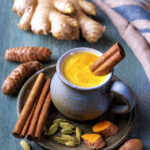
Is Coffee Acidic? pH, Inflammation, and Healthier Alternatives
Discover how coffee’s acidity impacts digestion, inflammation, and pregnancy—and why low-acid herbal alternatives like dandelion and chicory are gaining attention.
Quick Summary / Key Takeaways
- Coffee averages a pH of 4–5, making it acidic compared to water (pH 7).
- Acidity can trigger reflux, joint pain, or autoimmune flares in sensitive people.
- Brewing method matters: cold brew and dark roasts are less acidic than light roasts or French press.
- Research on coffee and inflammation is mixed; some studies show risk, others show protection.
- Herbal coffee alternatives like dandelion, chicory, and carob are naturally low-acid, anti-inflammatory, and pregnancy-safe.
Stats Snapshot & Comparison Table
| Beverage | Avg. pH | Caffeine | Inflammation Effect | Pregnancy-Safe? |
|---|---|---|---|---|
| Drip coffee | 4.8 | High | Mixed, may raise CRP | No |
| Cold brew coffee | 5.1 | High | Gentler on stomach | No |
| French press coffee | 4.7 | High | Higher acid extraction | No |
| Green tea | 7.0 | Moderate | Anti-inflammatory | Limited |
| Dandelion root coffee | 6.5 | None | Anti-inflammatory | Yes |
| Chicory root coffee | 6.3 | None | Gut-friendly, prebiotic | Yes |
| Carob coffee | 6.7 | None | Naturally sweet, low-acid | Yes |
Checklist: Lowering Coffee Acidity

Execution
- Choose darker roasts.
- Try cold brew instead of hot brew.
- Use paper filters to absorb acid-causing compounds.
- Add milk or non-dairy cream.
Advanced
- Experiment with low-acid coffee beans.
- Blend coffee with dandelion or chicory root.
- Transition to herbal coffee alternatives for a fully low-acid experience.
Intro
Coffee fuels mornings for millions, but it also sparks questions: is it too acidic, does it cause inflammation, and why do some people thrive on it while others suffer heartburn or joint pain?
On paper, coffee measures between pH 4 and 5, which means it’s acidic compared to neutral water (pH 7). But the real story goes beyond numbers. For people dealing with acid reflux, autoimmune conditions, or pregnancy-related nausea, that acidity can mean the difference between enjoying a morning ritual and facing discomfort all day.
This isn’t just theory—I’ve seen it firsthand as a Master Herbalist. Many of my clients came to me not because they disliked coffee, but because their bodies no longer tolerated it. Some had GERD flare-ups, others had autoimmune conditions where coffee became a trigger, and expectant mothers needed a safe, caffeine-free alternative. Their question wasn’t “Should I drink coffee?” but rather “What can I enjoy instead?”
In this guide, we’ll unpack coffee’s acidity, how it impacts health, and the low-acid, anti-inflammatory options you can lean on to keep the ritual alive—without the burn.
Table of Contents
FAQs Section
1. What does it mean that coffee is acidic?
Direct Answer: Coffee typically has a pH of 4–5, making it more acidic than water. The acids come from compounds like chlorogenic and citric acid.
Depth: Acidity isn’t just about chemistry—it affects flavor and tolerance. Some people enjoy the brightness it brings, while others experience discomfort.
Real Results: People prone to acid reflux often notice burning or bloating after coffee.
Takeaway: Coffee is naturally acidic; whether it bothers you depends on your body.
↑ Back to Table of Contents
2. Is coffee more acidic than other drinks?
Direct Answer: Yes, but not the most acidic beverage. Soda and citrus juices are far more acidic.
Depth: Coffee sits between pH 4–5, sodas average pH 2–3, and herbal alternatives hover around pH 6–7.
Real Results: Many people find soda harsher on the stomach than coffee.
Takeaway: Coffee is moderately acidic—less than soda, more than tea.
↑ Back to Table of Contents
3. Does coffee acidity cause reflux or heartburn?
Direct Answer: Yes, acidic and caffeinated drinks can worsen reflux symptoms.
Depth: Coffee relaxes the lower esophageal sphincter, making it easier for stomach acid to rise. Cold brew and low-acid blends may reduce symptoms.
Real Results: People with GERD often improve by reducing or eliminating coffee.
Takeaway: If reflux is frequent, try gentler brewing methods or herbal swaps.
↑ Back to Table of Contents
4. Can coffee acidity trigger inflammation?
Direct Answer: The research is mixed—some studies show coffee raises CRP (an inflammation marker), while others suggest antioxidants reduce inflammation.
Depth: The autoimmune protocol (AIP) diet excludes coffee because it’s a known trigger food for sensitive individuals.
Real Results: AIP dieters often report fewer flares once they stop coffee.
Takeaway: Coffee’s impact on inflammation is personal; if you have autoimmune symptoms, trial elimination is worth trying.
↑ Back to Table of Contents
5. Does acidic coffee worsen joint pain?
Direct Answer: Some evidence links coffee with higher osteoarthritis risk, but other studies suggest it protects against rheumatoid arthritis.
Depth: The acids and caffeine may irritate joints for some, while antioxidants may protect others.
Real Results: Some arthritis patients report flare-ups from coffee, while others see no change.
Takeaway: If you have joint pain, experiment with removing coffee and trying herbal alternatives.
↑ Back to Table of Contents
6. Which brewing methods reduce acidity?
Direct Answer: Cold brew, dark roasts, and paper filters reduce acidity compared to French press or light roasts.
Depth: Brewing time and water temperature control acid extraction—longer, cooler brews extract fewer acids.
Real Results: Cold brew can reduce acidity by up to two-thirds compared to hot brew.
Takeaway: Brewing style matters; cold brew is the gentlest option.
↑ Back to Table of Contents
7. Are there low-acid coffees on the market?
Direct Answer: Yes, several brands grow and roast beans to lower acidity.
Depth: These beans are often grown at lower altitudes or roasted darker. They reduce symptoms but still contain caffeine and some acids.
Real Results: Low-acid coffee helps some reflux sufferers but doesn’t eliminate issues for everyone.
Takeaway: Low-acid coffee is a step down—not a full solution.
↑ Back to Table of Contents
8. Is coffee acidity safe during pregnancy?
Direct Answer: Coffee is not recommended during pregnancy due to caffeine, and its acidity may aggravate nausea or reflux.
Depth: Herbal alternatives like dandelion or chicory root mimic coffee’s flavor without caffeine or harsh acidity.
Real Results: Many OB/GYNs advise avoiding coffee entirely.
Takeaway: For pregnancy, caffeine-free herbal alternatives are the safest route.
↑ Back to Table of Contents
9. What are the best low-acid coffee alternatives?
Direct Answer: Dandelion root, chicory root, and carob coffee substitutes are naturally low-acid and caffeine-free.
Depth: These herbs offer gut-friendly, anti-inflammatory benefits and fit AIP and pregnancy-safe diets.
Real Results: Sip Herbals blends these roots to create a satisfying, coffee-like experience without acid or caffeine.
Takeaway: Herbal alternatives provide flavor and ritual without the burn.
↑ Back to Table of Contents
10. How can I transition away from acidic coffee?
Direct Answer: Blend coffee with herbal substitutes, then taper down gradually.
Depth: Transitioning slowly reduces caffeine withdrawal and helps taste buds adjust.
Real Results: Many people find they don’t miss coffee after a few weeks on herbal blends.
Takeaway: Ease into it—gradual swaps make the change sustainable.
↑ Back to Table of Contents
Advanced Tips / Best Practices
- Track your triggers, not just coffee. A food/symptom journal helps spot patterns with reflux or inflammation.
- Try transitional blends. A 50/50 mix of coffee + dandelion or chicory eases the switch.
- Mind your timing. Coffee on an empty stomach worsens acidity; try pairing with food.
- Check pregnancy herbs carefully. Dandelion and chicory are generally safe, but always consult your provider.
- Think gut health long-term. Chicory root acts as a prebiotic, supporting healthy digestion.
Where to Learn More
Want more gut-friendly, AIP, and pregnancy-safe morning rituals? Click here.
Next Steps / Wrap-Up
Coffee is acidic—it’s part of its flavor and charm. But for many people, acidity worsens reflux, autoimmune flares, or pregnancy discomfort. The good news? You don’t have to give up the ritual. Herbal alternatives like Sip Herbals provide comfort, flavor, and energy without the acid. Click here.
Author Bio
Written by Orleatha Smith, Certified Master Herbalist
Orleatha Smith is a Certified Master Herbalist and co-founder of Sip Herbals, a revolutionary coffee alternative designed to deliver sustainable energy without the crash. With a background in biology and an advanced degree in education, Orleatha has spent more than a decade in the wellness community, helping people explore natural approaches to health. Her expertise has been featured on Shark Tank, in First For Women Magazine, The Los Angeles Times, WebMD, and on numerous podcasts and television programs.
Disclaimer
This article is for educational purposes only and does not replace professional medical advice. Always consult with your healthcare provider before making dietary changes, especially if you are pregnant, nursing, or managing a chronic condition.




